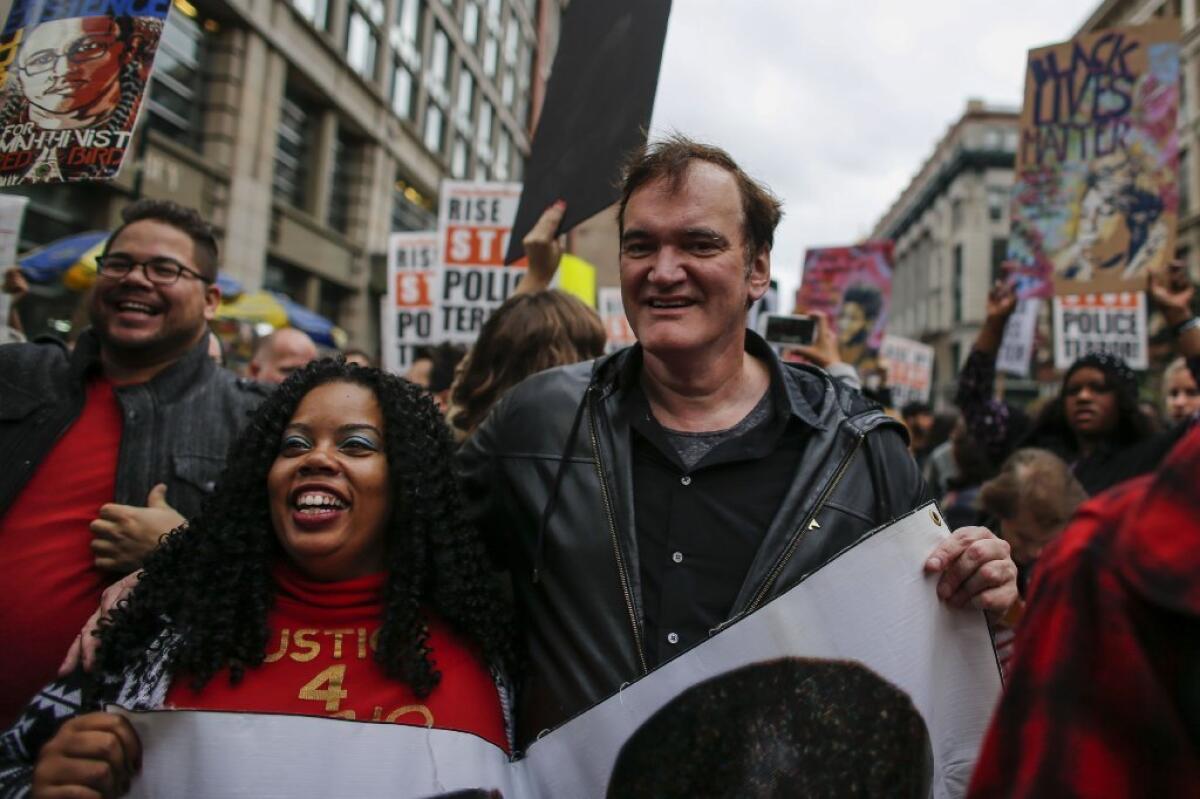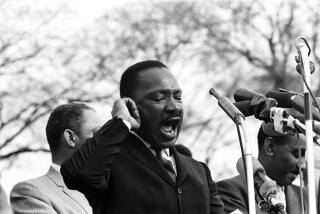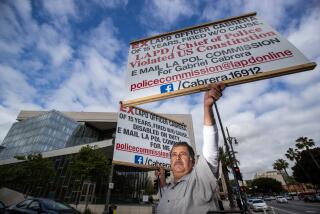Q&A: Quentin Tarantino responds to police boycott calls: The complete conversation

Quentin Tarantino marches in the Oct. 24 rally protesting police brutality.
- Share via
Shortly after filmmaker Quentin Tarantino appeared at a New York march protesting police brutality on Oct. 24, police groups across the country began calling for a boycott of his next movie, “The Hateful Eight,” taking issue with the remarks Tarantino made that day.
Tarantino had not addressed the controversy until he talked to The Times this week. The filmmaker offered no apologies to his critics, choosing to focus on explaining why he participated in the event and making sure that what he said was understood.
How did you become involved in the Rise Up October protest march?
They contacted me. They had heard some other statements I had made in interviews that they believed were in line with what they were thinking and they talked to me about appearing at the rally and doing my part. I was happy to do so.
SIGN UP for the free Indie Focus movies newsletter >>
Have you been involved with a protest like this before?
No. This was my very first rally of this nature. And understand, when I say I was happy to do so, I was really happy to do so. During that march, during that Thursday talk, that was me meeting these different family members, that was me talking to them and hearing their stories, that was me bearing witness to their stories. It wasn’t just broken down on a CNN sound bite. It wasn’t just broken down on 400 different little Internet articles. It was hearing their stories.
And during the march, it was me marching with them. One of the photos that they show a lot is me with my arm around a young woman. Her brother was killed by the police. And her story touched me very much when she told me. And we found each other during the march. And my arm was around her shoulders, her arm was around my waist and we held up a banner of her dead brother and his child.
That was a very, very moving experience. I was proud to stand with those people. There’s a lot of mouthpieces talking badly about me, but those families aren’t. Those families are defending me.
Defending you from the police group accusations that you’re anti-cop?
All cops are not murderers. I never said that. I never even implied that. I do believe that the cops who killed Eric Garner are murderers. I do believe that when Walter Scott was shot in the back in the park eight times by a cop, he was murdered. I do believe Tamir Rice was murdered.
Police groups would call that inflammatory rhetoric.
What they’re doing is pretty obvious. Instead of dealing with the incidents of police brutality that those people were bringing up, instead of examining the problem of police brutality in this country, better they single me out. And their message is very clear. It’s to shut me down. It’s to discredit me. It is to intimidate me. It is to shut my mouth, and even more important than that, it is to send a message out to any other prominent person that might feel the need to join that side of the argument.
Are you feeling intimidated?
I’m not being intimidated. Frankly, it feels lousy to have a bunch of police mouthpieces call me a cop hater. I’m not a cop hater. That is a misrepresentation. That is slanderous. That is not how I feel.
But, you know, that’s their choice to do that to me. What can I do? I’m not taking back what I said. What I was said was the truth. I’m used to people misrepresenting me. I’m used to being misunderstood. What I’d like to think is that their attack against me is so vicious that they’re revealing themselves. They’re hiding in plain sight.
One issue some people have with the protest march was the timing. It came four days after the killing of an NYPD officer in East Harlem.
I understand their sensitivity to that issue. That cop being killed in the line of duty was a tragedy. And the timing was unfortunate.
Nevertheless, the point of the protest was flying these families in and having them tell their stories from their own mouths, from their own perspectives of what happened to their loved ones, how they died at the hands of police or how they were killed in the name of law enforcement.
And we had flown those families in, so what was the choice? Send them all home? “I know we were flying you out here to tell your story about what happened to your loved one. But it’s just not really good timing right now. So hold on to that story. We’re sending you back home.” That’s not an option. The families were already out there.
Seeing those people there, seeing them fighting for their loved ones, trying to clear their loved ones’ names, demanding justice, that was wonderful.
— Quentin Tarantino
Has the experience of marching in that protest changed you?
It was a range of emotions. On the one hand, hearing those stories, bearing witness to those stories -- I can’t stress that term enough, “bearing witness to them” -- was very heartbreaking. And it was very powerful. And it was very sad.
At the same time, seeing those people there, seeing them fighting for their loved ones, trying to clear their loved ones’ names, demanding justice, that was wonderful. So there was a dichotomy of feelings that day.
Now, oddly enough, we were a completely sanctioned protest. We had our avenues of streets to walk. The police protected those avenues and they were even stopping traffic for us. And if you ask me -- not that I was on every end of the march, I was sort of out front with the families -- the police handled their duties completely respectfully. I thought they were fantastic. They didn’t jeer at us. They didn’t roll their eyes. They didn’t make fun of us. They didn’t provoke us. They did their job. We had the right to that protest and they protected our rights.
There was a report you were going to write an op-ed piece clarifying your comments that day. Is that true?
No. I don’t think I’m going to do that. I’ll talk to you. I’ll talk to a couple of TV things and then we’ll see where we are. As you can see, I’m not walking it back. But I am happy and eager to clarify what I said, compared to what it is they’re implying. I did not say anything that is making a cop more of a target than he was before Saturday. I am not saying anything that is putting cops’ lives in danger.

You stressed the importance of bearing witness to these stories. Film can do that too. There’s a power in people seeing their stories told on the screen.
Definitely. Harvey Weinstein released “Fruitvale Station.” The character that Michael B. Jordan played, Oscar Grant, his uncle was at the rally. That movie is devastating. Film can and should tell those stories. But there’s nothing like hearing the accounts. That was the main thing about what I was doing there. I wanted to stand with those people. But it was to bear witness and not just have it broken down to a sound bite, not just have it broken down to three minutes and Internet-hopping on websites.
And now you’ve become the sound bite.
You’ve got [New York Police commissioner] Bill Bratton saying ... I have it written down here ... “There are no words to describe the contempt I have for him.” Him being me. Yet when asked about the Eric Garner case, his quote is: “I personally don’t think race was a factor in that incident.”
If you watch the tape, you can tell that it was absolutely a factor in that incident. But I’m the one that he has no words for the contempt because I was against police brutality. But being against police brutality for him is being against the police.
Are you worried about security at premieres and events for “The Hateful Eight” before it opens on Christmas?
That’s a while from now and we’ll see. The people who are screaming against me are the mouthpieces for the police. They can call for a boycott. That doesn’t mean that cops are going to respond. Because I actually have a whole lot of fans that are police officers. And they’re not going to take [NYPD labor union head] Patrick Lynch’s word for what I said. They can read what I said. And I’m sure most cops will go, “That’s his opinion. He has a 1st Amendment right to walk in the march and a 1st Amendment right to say what he feels.” I didn’t say I hate cops. They’re saying that.
Have you personally heard from any police officers since all this started?
No. But oddly enough, to tell a little story, I had dealings with police officers the week before I left for New York. I had a trespasser on my property. It was like 1 in the morning and I look in my backyard and there’s someone there, looking like he’s wearing swim trunks.
Do you have a pool?
I have a pool. But he wasn’t in it. I told him to get the hell out of here. He went away and I called the cops. And he ended up still being outside when the cops got there, sitting in his car. The cops questioned him, but he wasn’t wearing swim trunks at the time. He was dressed and cool and collected. So they told him to get lost.
Then they came up to my house and we realized it was him because he had dropped his wallet when he came over the fence. And the officers were terrific. One guy told me, “You know, I had a suspicion about the guy, but nothing fit the profile we had been given on the police call. No swim trunks. And he wasn’t nervous. So I didn’t have enough to ask him to step out of the car.”
So they were explaining all this to me and as opposed to being angry, like, “You had the guy and you let him go!”, frankly, I felt good. “Oh. OK. There’s a threshold here. You don’t just make a guy get out of the ... car. There’s a threshold and he didn’t cross it and you didn’t cross it.”
I didn’t say that to them, but that’s what I felt. I felt like they had handled it really well. He was just trespassing. I chased him away myself.
Twitter: @glennwhipp
ALSO:
Why Michael Lewis says Adam McKay gets the Wall Street meltdown right in ‘The Big Short’
12 things we learned about Reese Witherspoon at her American Cinematheque tribute
What ‘Spotlight’ respects about the church-scandal-breaking journalists and the actors who play them
More to Read
From the Oscars to the Emmys.
Get the Envelope newsletter for exclusive awards season coverage, behind-the-scenes stories from the Envelope podcast and columnist Glenn Whipp’s must-read analysis.
You may occasionally receive promotional content from the Los Angeles Times.









